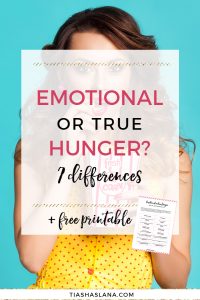EMOTIONAL OR TRUE HUNGER? 7 DIFFERENCES BETWEEN ONE AND THE OTHER
You come home after a busy day. You relax … and suddenly become extremely hungry.
Before you even realize, you are already in the kitchen, looking for something good to eat. Nothing is really good enough for you because you are looking for something specific.
You take a bite of this, a little bit of that … You justify your nibbling by telling yourself that after such a hard day, you deserve something good, something satisfying.
Munching on food gives you a momentary feeling of comfort. At that moment, you forget all your worries and stress. But soon you realize that your stomach became really full – so much that it almost hurts!
And then you regret your evening binge and just feel guilt and shame.
Have you ever experienced something like that? I certainly have.

A nagging boss, too much work, emotionally upsetting situations – all of this seem to disappear while you are eating.
And when you eat to fell better, you are eating emotionally.
This includes all that eating when you eat to calm yourself down when you reward yourself at the end of a stressful day, or whenever you eat to improve your mood. Even when you eat to celebrate something. And there are times when you eat just because it feels good and you don’t want it to end.
Yes, even good feelings can lead to emotional eating.
This is a huge problem because we don’t truly listen to our bodies when we eat emotionally. The fact that no true, physical hunger is present, is not a good thing.
It leads to binge eating, which leads to gaining weight and not feeling good in our bodies.
The same cycle repeats over and over again. Stress. Your need for comfort. A desire to eat. Eating. Relief. Positive feelings start to disappear. Guilt. Shame.
The need to soothe yourself. More stress because of guilt and weight gain …
Almost every one of us is occasionally faced with emotional eating, but for most this is not a major problem. It rarely happens for them.
For others, food can become the center of their lives. They are thinking about it all the time and just about every emotion shows itself by hunger.
I also had problems in the past with emotional overeating and I sometimes still notice the symptoms. But I learned to distinguish between true and emotional hunger and now I can figure out what’s really going on with my emotions and my body, and do the right thing.
(Wait for a true hunger and solve my emotional problems differently.)
Emotional eating can give us a temporary relief, a patch, so to say, but in the long run, it doesn’t bring anything good.
The biggest consequence is, of course, increased body weight and not feeling good.
But you don’t want this, do you? Of course not.
(I have also prepared a free printable for you – it’s perfect to put somewhere in the kitchen so next time you’ll be wondering “Is this true hunger?” you will quickly find your answer. 😉
EMOTIONAL HUNGER…
… is sudden.
At one moment, you don’t think about food at all, the next you are starving. The degree of hunger can instantly increase from zero to ten.
… is for specific food.
You have a desire for a specific food, nothing else seems enough.
… is urgent.
It seems to you that you simply can’t wait. Your hunger is so intense that you just have to eat something RIGHT NOW.
… shows itself with an upsetting emotion.
The boss was not happy with your work, you’ve got too much to do, your partner is in a bad mood, there is a stressful family celebration or a business meeting … Emotional hunger occurs with situations that are stressful or emotionally upsetting.
… includes automatic, mindless eating.
You hardly even taste the food, you just stuff yourself with it. You put your eating on autopilot.
… doesn’t stop when you are full.
Emotional hunger stems from a desire to repress certain feelings. That’s why it is difficult to achieve a sense of satisfaction, it seems that it is not in connection with the fullness of the stomach. It can happen that you eat a double or triple portion, even if your stomach hurts from over-fullness.
… gives you a negative feeling after eating.
You eat to feel better and you allow yourself to eat the food that you otherwise wouldn’t. Plus you also eat larger amounts of food than normal. Then you feel guilty because of that.
TRUE HUNGER…
… it is gradual.
Your desire to feed grows gradually and in relation to when you last ate.
… it’s open to many different foods.
You may have preferences, but you are open to many different foods. It is important for you that you get something nutritious.
… it can wait.
You would prefer to eat soon, but you can easily wait.
… occurs because of the physical need.
It appears because it has been 4 or 5 hours since you last ate and your body needs fuel.
… includes aware, mindful eating.
You are aware every bite from the mouth to the stomach. In every moment, you are consciously deciding whether you will eat an entire portion or jus half of it.
… stops when full.
True hunger stems from a desire for this to nourish the body and give it fuel. As soon as you feel satiated, you stop eating.
… gives a neutral feeling after eating.
When you eat out of physical need, there is no guilt or shame present. You realize that eating is normal and necessary.
I have also prepared a printable that will help you the next time you’ll be wondering: “Do I feel real hunger or just emotional?”
Tip: Stick it on your fridge or on the inside of your cupboards.
Download it below.
If you’d like even more information on how to cope with emotional eating, then I highly recommend downloading this emotional eating SOS toolkit I prepared for you.
So much goodness in here!! Just click HERE to download.
xoxo
Tiasha

Just ran across this and wow! I’m so thankful,..I will read and reread. Never knew this was the issue with me. Hope I can learn to read myself and my feelings better!